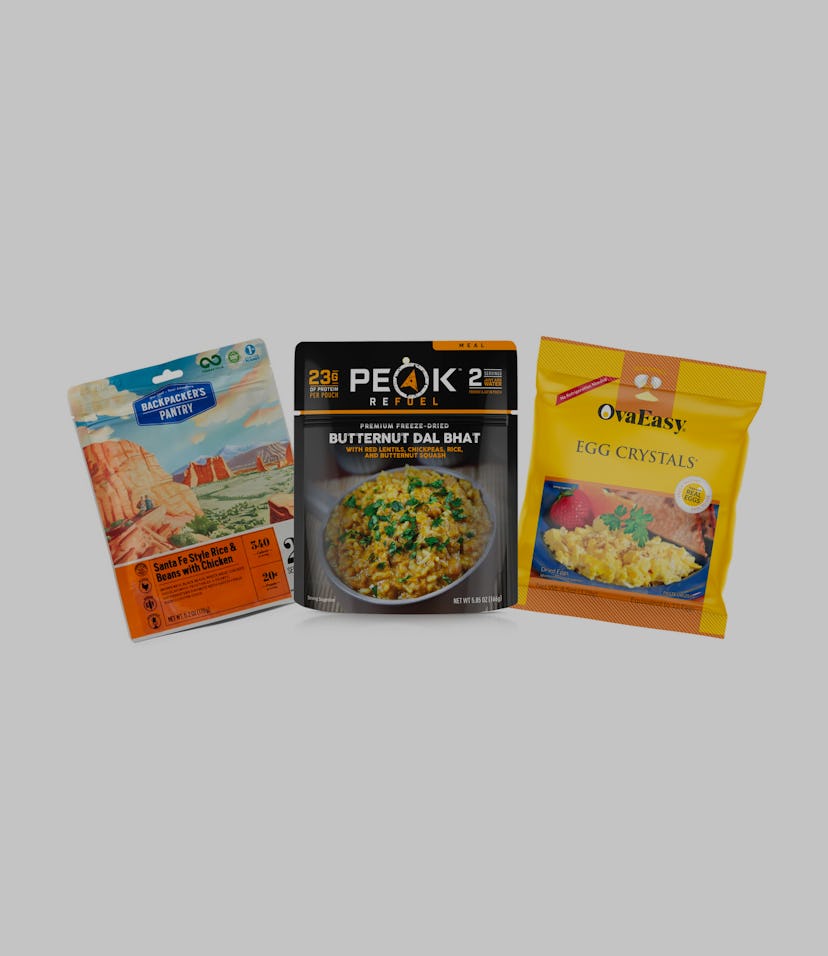Guides
The 9 best dehydrated meals for camping
A thru-hiker can burn between 3,000 and 5,000 calories in a day. That’s a lot to carry, and dehydrated meals are a lightweight way to up your calorie intake.

If sliced bread was a clever invention, dehydrated meals are genius. Lightweight, compact, long-lasting, and high in energy, all of the meals listed below can be prepared by simply adding hot water. Many of them can even be eaten straight from the pouch, keeping mess and effort at a minimum.
When hiking, there is usually a period of time when I’m miles from civilization, so I need to plan my meals in advance, and dehydrated meals are becoming ever more impressive in terms of nutrition and taste. Even if I’m walking a trail full of pit stops for refueling, I’ll keep at least one dehydrated meal stashed in my bag. You never know when the weather might turn, so it’s important to have extra rations in case of emergencies. Most dehydrated meals last around two years unopened.
What should I consider when food shopping for a trek?
Weight is really important. Your backpack will of course be at its heaviest when it’s full of food at the start of a trek, but it still needs to be manageable. Dehydrated pouch meals are some of the lightest, most nutritionally dense meals you can find for camping.
Look at the nutritional values and calorie information and remember that when you’re pushing your body physically all day, you’ll be hungrier than usual. Make sure that you have a camping stove adequate for the conditions, and enough fuel to see you through.
How can I make my dehydrated meal more exciting?
The dehydrated meals below are full of flavor, but that’s not to say they can’t be improved by adding extras. If you’re passing places that sell fresh produce, buy it and add it! All meals are better with fresh vegetables included, and your body will thank you for the nutrients, too. If you’re in need of extra calories, a splash of oil will make your meal more calorific, and add more flavor too.
With simple couscous and rice dishes, I often stir in an instant soup sachet. Not only does this add more taste, it ups your calorie intake at the same time.
What are the downsides?
The packaging for dehydrated meals is often non-recyclable, so you create a lot of waste. It can also be costly to live entirely off prepared, packaged meals. If you’re a regular hiker you might want to invest in a dehydrator to prepare your own dehydrated meals, which will be cheaper in the long term and will solve the issue of single-use packaging.
Input may receive a portion of sales if you purchase a product through a link in this article. We only include products that have been independently selected by Input's editorial team.
Taking just eight minutes to cook, Adventure Food’s Pasta ai Funghi is a speedy dish to prepare and provides 600 calories per serving (one pouch). There’s over half an ounce of protein, too, and unopened this will last for 48 months, so it’s an excellent emergency ration to keep in your pack. It’s a creamy and hearty vegetarian dish that weighs just four ounces uncooked.
Everything about the Wild Forest Mushroom Couscous screams indulgent. It’s organic and vegan. The list of all-natural ingredients includes miso, pine nuts, and shiitake mushrooms. You’ll struggle to get more flavor than this in a backcountry meal, but be aware that it only provides 270 calories per serving, so you might want to add extras and bulk it out.
The Peak Refuel Butternut Dal Bhat packs in a whopping 860 calories per packet (split between two, or eat the whole thing if you’re extra hungry). It takes 10 minutes to cook and with rice included too, it feels like a complete, filling, and nutritious meal.
Apple cider vinegar, simmered kale, and tamari — the ingredients list on Fernweh Food Company’s Red Beans, Greens and Coconut Rice reads like an upmarket restaurant menu rather than a pouch meal devoured on your tent porch. All of the ingredients are natural and vegan. One pouch (one serving) provides 520 calories and 0.7 ounces of protein. The only slight downside is that it takes quite a long time to cook: between 18 and 20 minutes.
One thing that I always miss while hiking is eggs. (Let’s be honest, they’re not the most transportable commodity). OvaEasy Egg Crystals contain the equivalent of 12 eggs — simply add water and cook as you would ordinary scrambled eggs. The taste isn’t much different from fresh eggs and a packet will last 30 months unopened, or six months once opened.
Each pouch of Mountain House Creamy Macaroni and Cheese contains 620 calories, which equals two servings or a meal for one hungry hiker. This meal is hearty, filling, and overwhelmingly yellow, just what’s needed after a day of physical exertion. It can be prepared in just nine minutes.
I can’t talk about the contents of Firepot’s dehydrated meals without first mentioning how vibrant and eye-catching the packaging is. The meal inside doesn’t disappoint, packing in 0.75 ounces of protein in a vegan dish. There are three types of beans in the Firepot Posh Baked Beans, and tabasco sauce for a kick. The regular pack contains 465 calories, and the extra-large pack has 695.
Sometimes we all crave sugar when hiking, and this dish is perfect for when a one-course backcountry meal just won’t cut it. The Astronaut Foods Freeze Dried Ice Cream Sandwich is very economical with a realistic taste, but unsurprisingly, it won’t be served chilled.
The Backpacker’s Pantry Rice and Beans with Chicken has a whopping 1.5 ounces of protein per packet (two servings). It’s gluten-free and can be stored for an impressive 10 years from the manufacturing date. This meal takes between 15 and 20 minutes to prepare and can be eaten straight from the pouch.